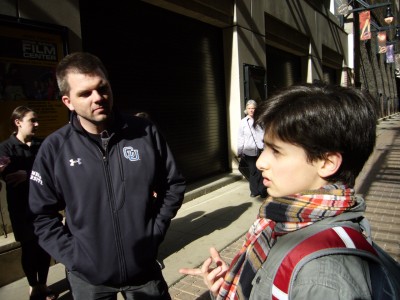Earlier this week, I blogged about Malcolm Gladwell’s third book, Outliers: The Story of Success (2008). Near the end of the book, Gladwell cites research by Alan Schoenfeld, a professor in the Graduate School of Education at the University of California, Berkeley, that suggests why some students succeed at math while others don’t. What does success in math ultimately boil down to? Attitude, not aptitude, Schoenfeld says. Gladwell explains: “Success is a function of persistence and doggedness and the willingness to work hard for twenty-two minutes to make sense of something that most people would give up on after thirty seconds.”
Among Gladwell’s various other claims is that “[S]uccessful people don’t do it alone. Where they come from matters. They’re products of particular places and environments.” That is to say, usually it’s not enough to be good — or even great — at something. Support systems, the right timing and just plain ol’ luck also play important roles.
This is something I’ve always believed in my gut: individual effort matters most of all, though it alone generally proves insufficient. Incredible individual effort is simply the first step on the way to success. An early start is often indispensable. Sidney Crosby, who at 22 has already led the Pittsburgh Penguins to a Stanley Cup and Team Canada to a gold medal in this year’s Winter Olympics, started playing hockey at age 2. He could skate by age 3.
Mozart, of course, was composing by age 5. It didn’t hurt that his father was a music teacher and composer who held a prominent position in the Archbishop of Salzburg’s court orchestra. Mozart was supernaturally gifted, but he also had a supportive — some would say exploitative — father. By the age of 6, Mozart was traveling around Europe and playing for the most important figures of his day.

Justin Snider Speaking with "Billy Elliot" Giuseppe Bausilio After the May 9th Performance (Photo by Sonny Datoy)
Another child prodigy, and one whom I’ve had the privilege to teach, is Giuseppe Bausilio. He’s currently starring in the Chicago production of Billy Elliot: The Musical.
Giuseppe’s success is the result of an early start — he began ballet at age 4 — and a very supportive family with dance deep in its blood. Both of Giuseppe’s parents were ballet dancers in their younger years and now they run ballet schools in Switzerland; his brother is a ballet dancer as well.
Two weeks ago I was in Chicago and had a chance to see Giuseppe on stage. Wow! He was nothing short of fantastic, and the standing ovation was more than well-deserved.
The lead role of this musical is so demanding that four boys share it in Chicago; on Broadway, five boys are currently playing Billy. They must be exceptional at ballet, of course, but they must also be skilled at singing, acting and modern dance. It’s no wonder that Billy Elliot — which premiered in London five years ago — has conducted worldwide searches each time it has sought “new” Billys. I have been lucky enough to see Billy Elliot in London, New York and Chicago, and I’m always struck by the professionalism of the young actors. It’s hard to believe that anyone can pull off some of the show’s moves — and it’s all the more incredible that 12- and 13-year-olds can.
If you have yet to see Billy Elliot, I strongly suggest you make it a top priority. And if you don’t happen to live in one of the cities where it’s currently playing, you might just be in luck. A U.S. National Tour will begin later this year. The musical will also be opening in Seoul, South Korea this August and in Toronto, Canada next February. You’ll be awe-struck by the sheer talent of the young performers.
As Gladwell says, “It is not the brightest who succeed. … Nor is success simply the sum of the decisions and efforts we make on our own behalf. It is, rather, a gift. Outliers are those who have been given opportunities — and who have had the strength and presence of mind to seize them.”



